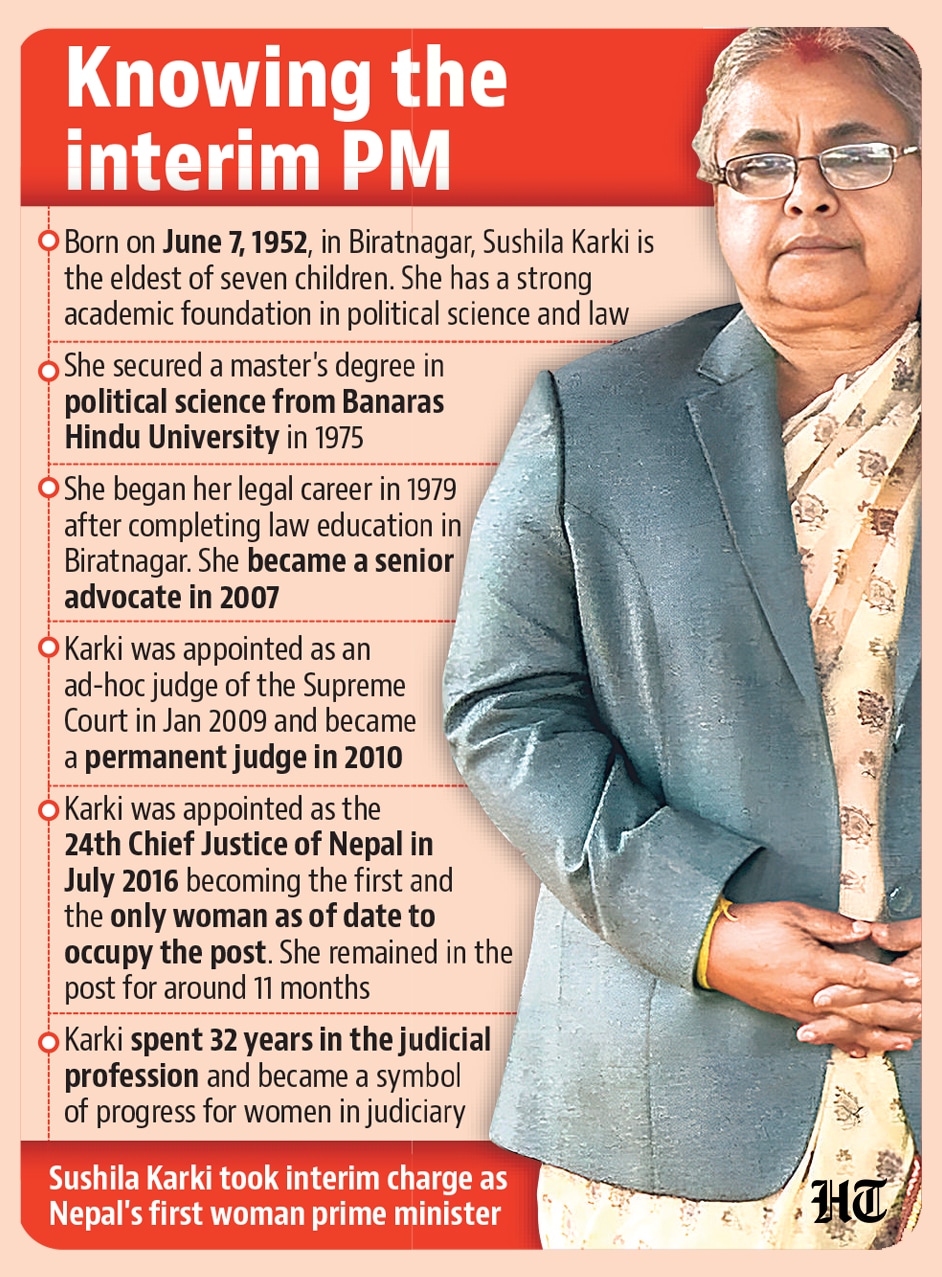Sushila Karki’s journey from Nepal’s first female chief justice to first woman PM
Sushila Karki’s elevation as prime minister comes after protests by youths that killed 51 people and brought down the previous government
KATHMANDU: A no-nonsense judge who scripted history by jailing a minister for corruption in Nepal, Sushila Karki first stepped into the limelight in July 2016 when she became the first woman chief justice, and the only one till date, of the Himalayan nation. On Friday, that journey scaled a new height as the 73-year-old took oath as the interim prime minister of a country convulsed by violence that killed 51 people and displaced an entire regime.

Also Read: Nepal's parliament dissolved hours after interim PM Sushila Karki took oath, elections announced
Karki emerged as the leading candidate for many “Gen Z” representatives -- the loose umbrella title of the protest movement. She told Nepali media that the Gen Z protesters had told her that “they believe in” her to lead for “a short time for the purpose of doing elections”.
Also Read: Nepal picks ex-chief justice Sushila Karki as first woman PM
“I have known her since her days as a practising advocate. You cannot question her stand on corruption and her knowledge about the constitution. She was tough during her tenure as Chief Justice and followed the law in its spirit,” said senior advocate Harihar Dahal, former chief of the Nepal Bar Association.
Born on June 7, 1952 at Shankerpur-3 in eastern Nepal’s Biratnagar, close to the Indian border, Karki was the eldest of seven children and spent her childhood at a farm. She completed her bachelors from the Mahendra Morang campus, Tribhuvan University in 1971 and secured a masters degree in political science from Banaras Hindu University (BHU) in 1975. She returned to Tribhuvan University to earn a degree in law in 1978.

“Karki met Durga Prasad Subedi, her future husband, while studying in BHU,” said socialist leader Vijay Narayan. Subedi is associated with the Nepali Congress and was allegedly embroiled in Nepal’s first plane hijacking in 1973 for political reasons.
RP Pathak, who studied political science and later became professor at BHU, was a batch junior to Karki. “She was our senior. She was a studious student,” he said.
Karki spent 32 years in the judicial profession and became a symbol of progress for women in the field of judiciary. She started her law practice in Biratnagar in 1979 when her strong academic background shaped her legal career. In between she was also appointed as an assistant teacher at Mahendra Multiple Campus, Dharan in 1985.
She became a senior advocate in 2007 and was appointed as an ad hoc judge in the Supreme Court in 2009. She became a permanent judge on November 18, 2010.
“We were both bar leaders at one point of time. Even when she was the chief justice, I have been in her court. She is very honest and the young people behind the current movement seem to be fond of her. It is true that she is not corrupt and is fearless. Her honesty cannot be questioned,” said senior advocate Tika Ram Bhattarai.
In 2012, Karki was one of two presiding Supreme Court judges who jailed a serving government minister for corruption -- a first at the time for Nepal in its battle against a culture of graft.
As judge, Karki showed zero tolerance for corruption and took on powerful interests, in a stance that may have cost her the top judicial post, as the government moved to impeach her less than a year into her tenure as chief justice. The proposal was dropped after public pressure, but a disillusioned Karki quit on her own.
“Personally speaking, she was a tough judge, who did not fear anyone. Anyone in the legal field knows the mettle that she is made of,” said senior advocate Kedar Prasad Koirala, secretary general of the Nepal Bar Association.
Even after her retirement, she remained outspoken on corruption. “We see it everywhere but we don’t speak -- now we need the youth to speak up, take the lead and stand in elections”, she told Nepali media earlier this year. “What I have seen in the last 35 years does not work, I am 100 percent in favour of youth coming forward.”
She frequently recalled her ties to India. In an interview to news channel News 18 this week, Karki spoke about how India was only 25km from her ancestral home. “India has helped Nepal at all times. We are very close… (But) there is a saying (in Hindi): ‘When utensils are kept together in the kitchen, they do make some sound.’ It happens,” she said.
She also recalled her days at BHU. “I still remember my teachers, friends. I still remember the river Ganga. Beside the Ganga, there was a hostel. And at night in the summer, we would sleep on the (terrace),” she told the channel.
But after a storied legal career, she is now entering uncharted political waters. After the deadly protests, the country is on razor’s edge with sweeping prohibitory orders, army patrolling the streets and key political leaders, now discredited, in hiding.
“The main challenge before her will be to take all parties into confidence and ensure there is no further violence or breakdown of law and order. She excelled and proved herself in the legal field,” said Dahal. “Only time will tell how she fares as a politician.”
(with inputs from agencies)





